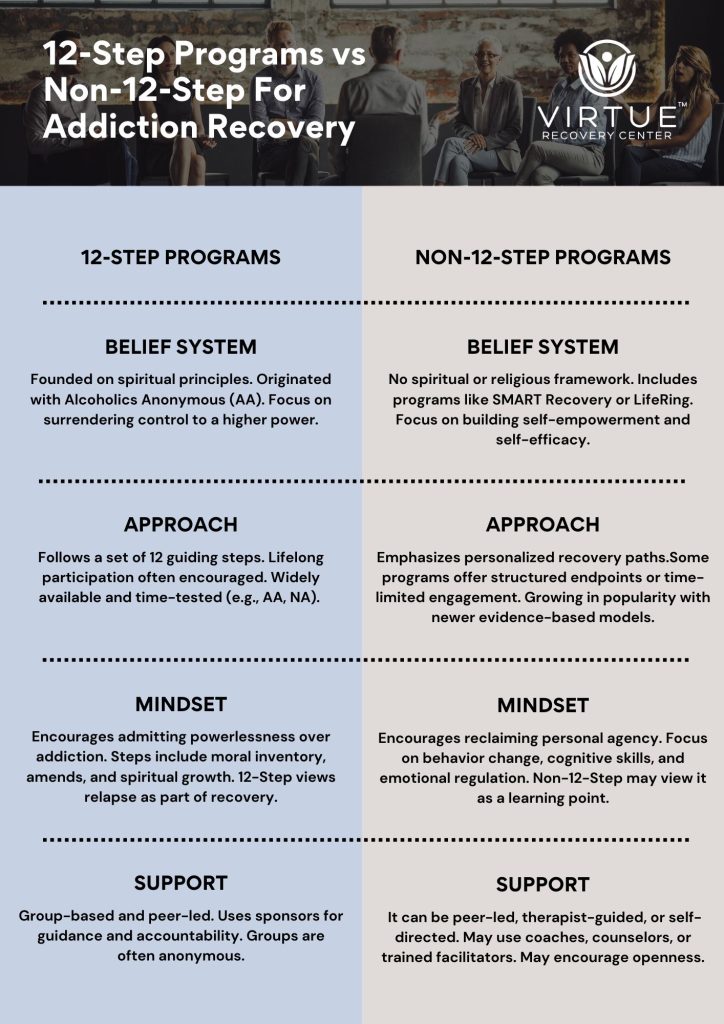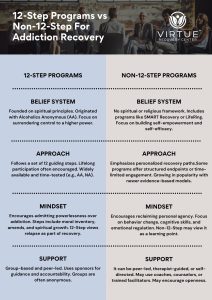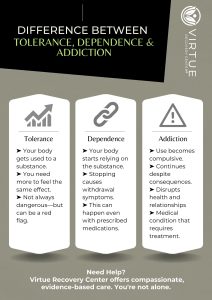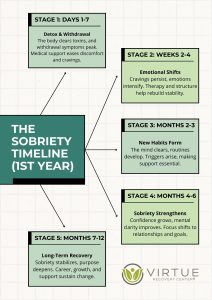Key Takeaways
- 12-step programs like Alcoholics Anonymous (AA) and Narcotics Anonymous (NA) offer spiritual, peer-based support.
- Non-12-step programs, such as SMART Recovery and LifeRing, focus on science-backed, self-empowered recovery.
- Both models can be effective, depending on personal beliefs, needs, and goals.
- Some people benefit from combining both approaches in their recovery journey.
Introduction
Addiction recovery doesn’t come with a one-size-fits-all solution. What helps one person might not work for another—and that’s perfectly okay. For decades, many people have found hope and healing through 12-step programs like Alcoholics Anonymous (AA). Others, however, look for different paths that align more closely with their personal beliefs or mental health needs.
This article breaks down the differences between 12-step and non-12-step addiction treatment approaches. Whether you’re exploring options for yourself or a loved one, understanding the core features of each can help you take the next step with confidence.
What Is a 12-Step Program?
A 12-step program is a structured approach to addiction recovery that focuses on spiritual principles, peer support, and personal growth. These programs encourage participants to admit powerlessness over addiction, believe in a higher power (as they understand it), and make amends for past harms. Most meetings are free and widely available in communities across the U.S.
These programs aren’t run by doctors or therapists—they’re peer-led. People attend meetings, often with a sponsor, and share experiences in a supportive environment. For many, this structure provides comfort, accountability, and long-term support in staying sober.
Why Some People Thrive in 12-Step Programs
There’s a reason 12-step groups have helped millions of people around the world. They offer connection—especially important when addiction has left someone feeling isolated or ashamed. The spiritual foundation, while not tied to any specific religion, gives some people a sense of purpose and guidance.
Many also appreciate the idea of progress, not perfection. You’re encouraged to take it one day at a time, and that makes recovery feel a little more manageable.
Limitations of the 12-Step Approach
While helpful for many, 12-step programs don’t work for everyone. Some people struggle with the spiritual aspects, especially if they don’t believe in a higher power or come from a different faith background. Others may feel uncomfortable with the idea of being “powerless” over their addiction, preferring a model that emphasizes self-agency and personal responsibility.
And while peer-led meetings offer valuable support, they aren’t a substitute for mental health treatment—especially for those with trauma, depression, or dual diagnosis concerns.
What Is a Non-12-Step Program?
Non-12-step programs offer an alternative to traditional recovery models. These groups often focus on self-management, science-based tools, and emotional resilience, rather than surrendering to a higher power or following a set of spiritual steps.
Programs like SMART Recovery, LifeRing Secular Recovery, Women for Sobriety, and Secular Organizations for Sobriety (SOS) take different approaches, but they share a common goal: helping people build a sober life through education, accountability, and self-empowerment.
Instead of working through 12 steps, participants learn practical strategies to manage cravings, navigate emotions, and reshape negative thinking patterns. Many non-12-step models also include peer support—but without the spiritual structure.
Who Might Benefit from a Non-12-Step Program?
Someone who values independence and personal responsibility may feel more at home in a non-12-step setting. These programs can also be ideal for people who don’t relate to religious or spiritual recovery frameworks.
Additionally, those with co-occurring mental health conditions—like anxiety, PTSD, or depression—may appreciate the integration of evidence-based tools like cognitive behavioral therapy (CBT) or mindfulness practices, which are more common in non-12-step environments.
Can You Combine Both Approaches?
Absolutely. Recovery isn’t black and white, and many people find that blending elements from both types of programs offers the best support. For example, someone might attend AA meetings for community connection while also using SMART Recovery tools for managing triggers and emotions.
What matters most is finding what helps you stay sober and feel whole. There’s no single “right” path. Your recovery is your own—and it can evolve over time.
Making the Right Choice for You
Choosing between 12-step and non-12-step programs starts with knowing yourself. Ask questions like:
- Do I want spiritual guidance or a secular approach?
- Do I thrive in group settings or prefer one-on-one support?
- Have I tried a program before? What did or didn’t work for me?
- Do I need mental health support in addition to addiction treatment?
You don’t have to have all the answers today. The most important thing is that you’re looking for help—and that means you’re already on the right track.
Support That Respects Your Journey
At Virtue Recovery Las Vegas, we believe recovery should be personal, compassionate, and empowering. That’s why we offer both 12-step and non-12-step programming—so you can choose the support system that fits your beliefs, your background, and your goals.
Whether you feel most comfortable working through the 12 steps, or you prefer a non-spiritual, self-management approach, our team will walk beside you. We also provide dual diagnosis treatment, therapy, medical detox, and aftercare planning—because real healing goes deeper than the surface.

Conclusion
Recovery isn’t about fitting into a box. It’s about finding a program that makes you feel seen, supported, and hopeful about the future.
Whether you connect more with a 12-step approach or a non-12-step alternative, what matters most is taking action. Healing happens when you commit to change and surround yourself with people who believe in your potential.
If you’re ready to take that next step—or if you’re just exploring your options—call 866-520-2861 today. The team at Virtue Recovery Las Vegas is here to listen, guide, and help you build a recovery plan that works for you.
FAQs
What is the difference between 12-step and non-12-step programs?
12-step programs focus on spiritual growth and peer-led support, often involving belief in a higher power. Non-12-step programs are typically secular, based on scientific methods and personal empowerment.
Can I use both types of programs at the same time?
Yes. Many people blend approaches to find what works best for them. You might attend AA meetings for community and use SMART Recovery for coping skills.
Is one recovery model better than the other?
Not necessarily. Both models can lead to long-term recovery. The best one is the one that meets your needs and feels right to you.
What if I don’t believe in God or religion?
That’s totally okay. Non-12-step programs like SMART Recovery or LifeRing are completely secular and don’t require spiritual belief.
Where can I get help choosing a program?
Call 866-520-2861 to speak with a professional at Virtue Recovery Las Vegas. We’ll help you explore your options and create a recovery plan that’s right for you.
What are 12-step programs for addiction treatment?
12-step programs, such as Alcoholics Anonymous (AA), are structured support groups that follow a set framework of 12 steps designed to promote recovery from addiction, encouraging individuals to admit powerlessness over their substance use and to seek help from a higher power or community.
What is the difference between 12-step programs and non-12-step programs?
The primary difference lies in the approach to recovery. 12-step programs often incorporate spirituality and a higher power in their recovery process, while non-12-step programs, like SMART Recovery and LifeRing, focus on self-management and evidence-based practices without the spiritual component.
Can you explain what SMART Recovery is?
SMART Recovery is a non-12-step alternative program that empowers individuals in recovery to manage their addiction through self-help techniques and cognitive-behavioral strategies, focusing on building motivation, coping with urges, and creating a balanced life.
What are some alternatives to 12-step programs for addiction treatment?
Alternatives to 12-step programs include SMART Recovery, LifeRing, Women for Sobriety, and other secular recovery programs that emphasize self-help, personal responsibility, and scientifically supported methodologies rather than spiritual elements.
How does participation in 12-step groups affect sobriety?
Participation in 12-step groups can significantly enhance sobriety by providing social support, accountability, and a shared understanding of addiction experiences, which may lead to better recovery outcomes for many individuals.
Are 12-step programs effective for everyone?
While many individuals find success in 12-step programs, they may not work for everyone due to personal beliefs, preferences, or experiences. It is essential for individuals to explore various treatment programs to find the best fit for their recovery journey.
What role does spirituality play in 12-step programs?
Spirituality is a core component of 12-step programs, as they often encourage participants to seek guidance and strength from a higher power, which can provide comfort and support during the recovery process.
Can 12-step programs be used in conjunction with other treatment programs?
Yes, many individuals combine 12-step programs with other treatment programs, such as therapy or rehab, to create a comprehensive addiction treatment and recovery plan tailored to their needs.
What is the importance of group participation in addiction recovery?
Group participation in recovery programs fosters a sense of community and belonging, helps reduce feelings of isolation, and provides opportunities for individuals to share experiences, challenges, and successes, which can be vital for sustained sobriety.












